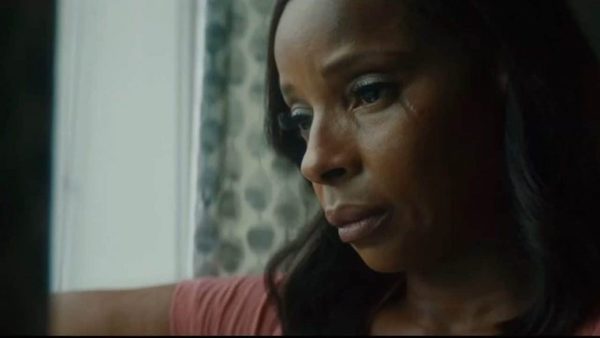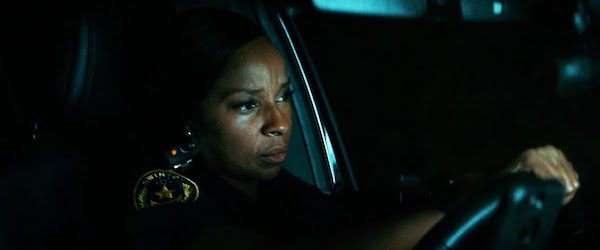All horror movies deal with social issues on some level, but few are as obstinate about it as Body Cam. Starring Mary J. Blige and Nat Wolff, the Paramount feature opened on streaming platforms May 19.

Zeroing in on police violence against people of color, Body Cam starts with LAPD Officer Ganning (Ian Casselberry) staring down animosity in a diner while the TV shows demonstrations over the latest cop shooting. Ganning is then killed during a routine traffic stop.
Returning from a suspension for striking a civilian, Renee Lomito-Smith (Blige) is one of the first cops on the scene. She looks through Ganning’s body cam footage on the computer in his patrol car. Before the hard drive is erased in a technical glitch, she glimpses what looks like supernatural fury.
No one believes her, not even her new partner Danny Holledge (Nat Wolff). As cops in her unit fall one by one, Renee is tormented by nightmares. She and her husband are still grieving over the death of their young son.
Disobeying Kesper (David Zayas), her sergeant not to get involved in the case, she uncovers clues tying Ganning’s death to a previous incident in which a black youth named Demarco Branz (Mason Mackie) was killed by police.

Accompanied by a reluctant Holledge, Renee breaks into the apparently abandoned house owned by Demarco’s mother Taneesha (Anika Noni Rose), which is right when your patience with the script (by Richmond Riedel and Nicholas McCarthy) may wear thin.
Up until this point Body Cam plays it relatively straight. Sure, the world is a dank, gloomy one lifted from Se7en, but the cops act as if they’re in Training Day, still the standard for a street-smart thriller. There’s a level of realism to the film that adds tension to each encounter, whether it’s a kid playing in the street or a junkie robbing a convenience store. These cops are in danger, and they’re seen as enemies by the very people they’re trying to help.
But this is horror, not drama, which means director Malik Vitthal has to come up with scares without giving the game away. Like the found footage in Paramount’s Paranormal franchise, the personal body cameras the cops wear here let Vitthal suggest horror without explaining or even showing it.
That’s okay until the script runs out of legitimate jolts. Then Vitthal is stuck with endless scenes of Renee and Holledge creeping into derelict warehouses, up and down dark stairs, poking into closets and dressers and boxes labeled with drawings of skulls. It’s a long slog to the denouement, which raises more questions than it answers.
Body Cam looks convincingly grimy, and apart from some terrible dialogue the cast is okay. Blige operates on a higher level. Wounded by loss, Renee is struggling with personal demons as well as the demands of her job. Blige gives a taut, unsentimental performance that captures her character’s confusion and doubts. She is the best reason to watch Body Cam.


